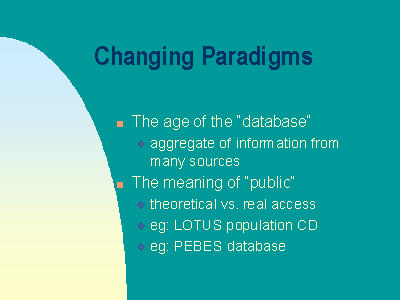
|        |
Slide 5 of 25

|        |
Slide 5 of 25
|
While privacy problems existed before there were computers, computers have changed the privacy landscape considerably. One obvious area of change is in the ability to gather and process millions of minor transactions, and to combine these with millions of other transactions to create a profile of who we are, what we buy, where we go.
Computerized access to information requires us to re-think the meaning of "public" information. As part of our open, democratic society, we consider certain information to be public: voter registration, property ownership, marriage, divorce, birth and death records. There are also some records that are public although they might be embarassing, such as arrest records. In the pre-electronic world, to obtain these records you had to go down to the city or county hall of records in the relevant jurisdiction and look through paper or microfilmed documents. In the near future, much of this information will be available over computer networks and will be at the fingertips of many millions of people all over the globe. This easily available information will be used in ways that were never imagined. Does this change the meaning of the term "public information?"
|